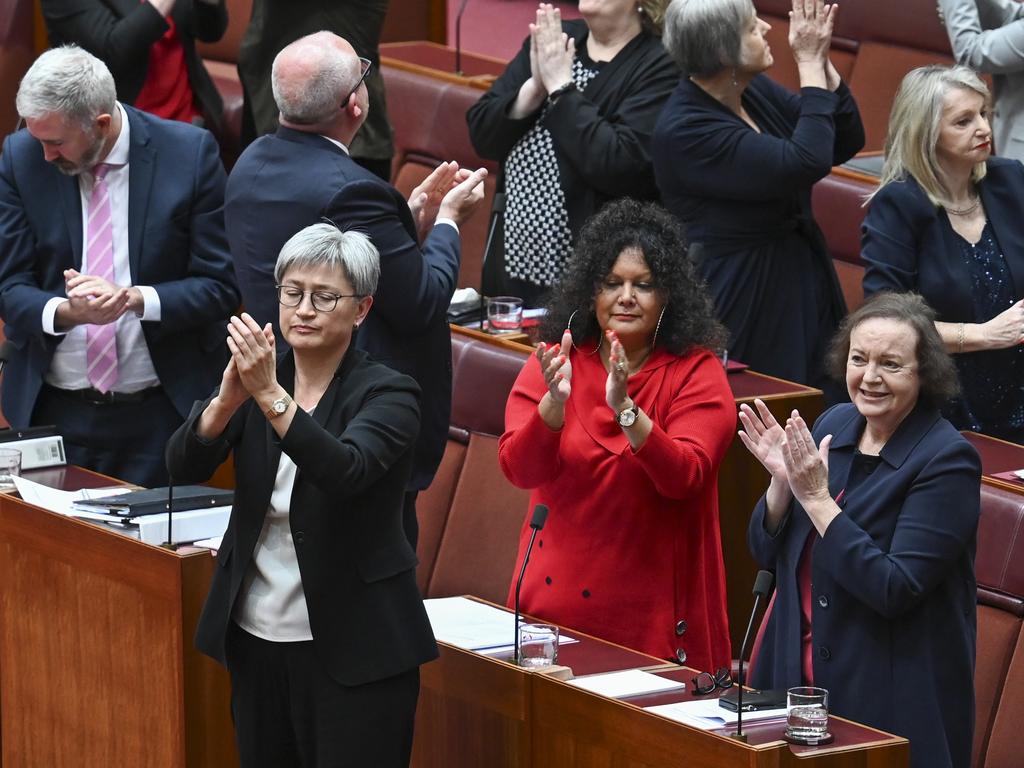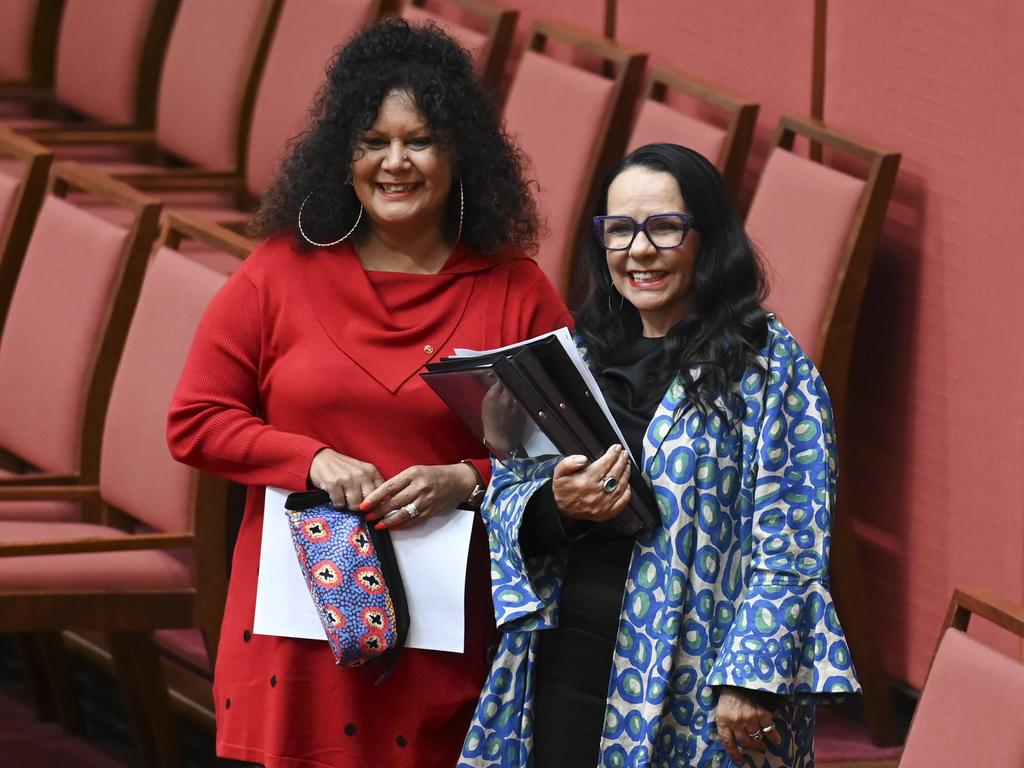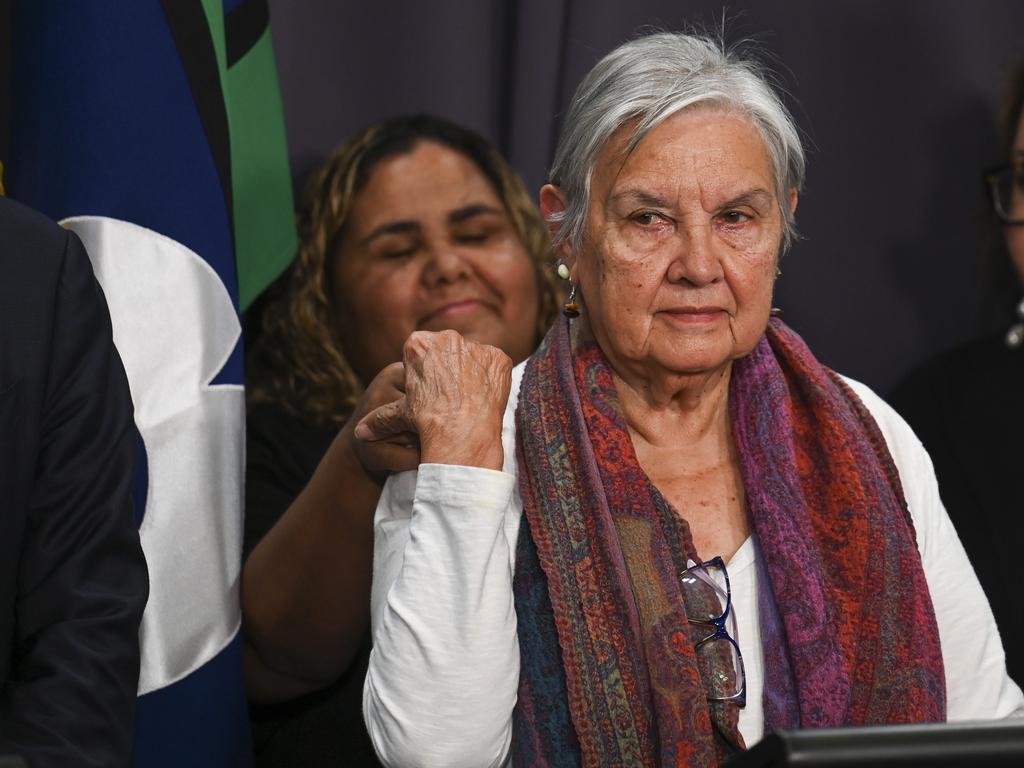Labor’s deflection exposes fatal flaws at heart of Indigenous voice to parliament


The Prime Minister hailed the “walk with us” moment, saying to the public: “This is your time, your chance, your opportunity to be a part of making history.” He called it a “moment of national unity”, listening to Indigenous people from “the remotest corners of our vast and beautiful continent”.
It was evocative and emotional. It was impossible not to feel a sense of affirmation. Indigenous leader Pat Anderson said: “We have been calling for recognition, respect, acknowledgment since the first boats came here.” That is so true.
But in opening the media conference, Albanese did not highlight the main issue of the referendum – the voice – because the tactic of the Yes campaign is to make the referendum about recognition, not the voice.
The voice is the disappearing element yet it won’t disappear. The trouble is this tactic conflicts with the wording of the constitutional amendment. If you vote Yes you will create a new chapter IX of the Constitution and a new section 129 that specifies an Aboriginal and Torres Strait Islander voice, with each subsection dealing with the voice, its name, its powers and the powers of the parliament in the operation of the voice.
As Indigenous Australians Minister Linda Burney said, the purpose of the referendum is to achieve “constitutional recognition through a voice”. There can be no disguising the purpose – it’s about creating a new institution in the operation of our governance, enshrined in its own chapter just as the Constitution has its separate chapters for parliament, executive government and the judiciary.

The voice, however, is the focus of contention, dispute and fundamental conflict over principle. The fracture in this nation over the referendum has nothing to do with recognition and everything to do with the voice. That will only intensify in coming months.
Anybody who has a spare five hours should read the bitter debate that took place in the Senate last Friday afternoon, night and early Saturday morning, a debate that resumed on Monday morning before the 52-19 vote authorising the referendum. This was the alternative world that Albanese needs to suppress to carry the referendum.
It saw the voice under continual assault over its powers, over how it will be constituted, over its cultural legitimacy and the potential for it to significantly change our parliamentary and executive system. At one point Indigenous Coalition opponent Jacinta Nampijinpa Price said the bill “is opening a doorway to a lot more than I think this government can handle”.
Opposition legal affairs spokeswoman Michaelia Cash asked the government minister with carriage of the bill, Murray Watt: “Will the voice have the freedom to determine the issues on which it makes representations?” Watt answered: “Yes.” He said the voice could “decide for itself” what it offered advice about.
The constitutional amendment is designed this way. The scope is opened-ended. The institution being created is a group rights political body – representing one segment of the nation – that has the constitutional power to make representations on any issues that concern Indigenous people as well as issues that concern the general community because Indigenous people are part of the general community.

It can proactively make representations to the parliament or executive government. The voice can make representations on welfare, law, resources, health, the National Disability Insurance Scheme, foreign affairs and defence. Labor and voice advocates keep saying its job is to advise on the core issues of health, education and housing. That, of course, is highly desirable. But such statements are worthless. Nobody, not Albanese, not the Indigenous leaders, can predict what the voice will do, how wide it will range, what it will choose to prioritise.
Nobody knows. The only thing we know is the power that is being created in the Constitution. That is what counts. It is extraordinary that Labor is proposing a referendum and wants to conceal, disguise or play down the power it seeks to put into the Constitution. Has this ever happened before?
It is equally extraordinary that on Monday after a year of debate, after the referendum bill had been passed, Burney was unable to answer the question from Liberal deputy Sussan Ley on “what areas of public policy” will not be within the scope of the voice. Burney said the opposition was throwing “red herrings”.
By Tuesday the government had an answer – the second reading speech! That speech said the voice would advise on issues “specific” to Indigenous people and on general issues that affected Indigenous people “differently” to the rest of the community. Any notion this will limit the constitutionally authorised scope of the voice is dubious in the extreme. It wouldn’t be hard for the voice to argue that Australia Day, climate issues, resources decisions or defence decisions in the Northern Territory affected Indigenous peoples differently.
Yet Burney told parliament the voice wouldn’t give advice on Australia Day. On what basis does the government assert this? The voice can be proactive. Australia Day concerns Indigenous people and affects them differently. At face value, the voice can give advice on Australia Day. How did Burney reach her conclusion?
The government is in dangerous waters now – as the Coalition puts up various scenarios, Labor is desperate to mock them or deny them and risks making misleading assertions about the powers of institutions it seeks to create in perpetuity.
Indigenous voice champion Megan Davis has said the voice can speak to “all parts of government” from the Reserve Bank to Centrelink. Davis said the parliament will not be able to “shut the voice up”. Has Burney corrected her? Davis made that assertion because that’s the power being put into the Constitution.

It doesn’t matter how much Albanese ridicules the opposition’s questions or Labor MPs shake their heads in disapproval, the government is locked in. These are Labor’s decisions. Labor had a year to change this proposal. It was warned repeatedly. It declined to act. Yet the day after the bill has been passed the minister is freelancing, trying to limit the voice’s scope. It’s too late. But it betrays the vulnerabilities surrounding the voice.
The government is going to face a campaign along the lines the Coalition foreshadowed this week. The protracted Senate debate shows the Coalition will run on over-reach of the voice, its departure from equality of citizenship and the disruption it threatens to our system of governance.
Labor’s strategy has been to limit detail and deny any far-reaching consequences. In reality, however, there are multiple grounds for unease and concern about the voice. Burney is right in saying Indigenous people are poorer, sicker and more incarcerated and that a new approach is needed. But that doesn’t justify the voice.
For the Australian people there is a core question: should they vote on the principle of recognition and ignore the voice – which would mean a Yes vote? Or should they confront the real issue at this referendum and pass a judgment on the voice – if so, it is hard to imagine anything but a No result.






There were two competing world views on display in Parliament House this week when the referendum bill was passed, with Anthony Albanese invoking the beauty of the Uluru statement and saying it was time for the people to say Yes to reconciliation and constitutional recognition.